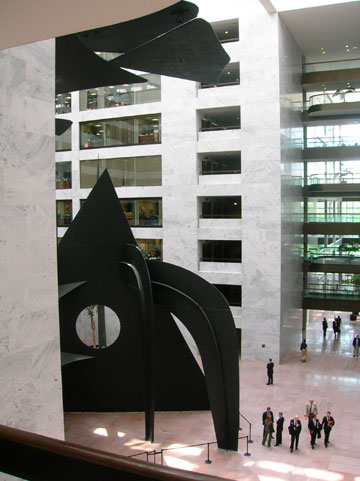 by Preston MacDougall June 03, 2008
Congress has taken action by subsidizing renewable biofuels like grain alcohol, but only succeeded in launching the price of staple foods. It seems to me that the sky-high price of gasoline has had an effect on Americans today that is similar to what Sputnik's overhead flight did back in October of 1957. People have been surprised by it, and feel insecure even though a beeping fuel pump does not physically threaten them. They want the government to do something that solves the problem without creating bigger ones.
The first thing the US government did after Sputnik orbited Earth, beeping all the way, was to rush the launch of the Navy's Vanguard rocket and satellite. Unfortunately, the televised projectile dysfunction on the launch pad only made things worse. After this military failure, President Eisenhower, who was a former five-star Army General, had the foresight to put the nation's space program in a civilian branch of the government. NASA was created by legislation within one year of the Sputnik surprise. However, most people don't think of Eisenhower when they think of the "space race", they think of John F. Kennedy. In particular, they think of his televised "Special Message to the Congress on Urgent National Needs", where he famously said: "I believe that this nation should commit itself to achieving the goal, before this decade is out, of landing a man on the moon and returning him safely to Earth." This goal wasn't just thrown into an annual State of the Union speech, later to be forgotten, like President Bush's mission to Mars. It was a key part of a detailed plan to achieve economic and social progress after a recession, and to simultaneously build the military and intelligence shields, including satellites in space, that were needed at the height of the Cold War. The speech was given in May of 1961,not long after Kennedy's first State of the Union address at the end of January. What happened in between? On April 12, Yuri Gagarin took a victory lap around the Earth in the Vostok 1 spacecraft on the same day that the CIA launched their botched invasion of Soviet-controlled Cuba at the Bay of Pigs. It took a while for the US to catch up to the Russians in space - it was almost a year before John Glenn would be the first American to orbit the Earth. But, just as Kennedy had envisioned, in July of 1969 Neil Armstrong and Buzz Aldrin walked on the moon, and Mike Collins orbited above so that all could be returned safely to Earth. Apollo 11 was so successful that it redecorated bedrooms of children all over the country. As a Cold War victory, it's success included redecoration of children's bedrooms in other countries as well, such as mine in Canada. In addition to Eisenhower's wise creation of a civilian space agency, I think it was yet another one of Kennedy's 1961 speeches that provided the motivation for many of the heroes that put a man on the moon and returned him safely to Earth. In his Inaugural Address on January 20, 1961, he memorably told his fellow Americans: "ask not what your country can do for you - ask what you can do for your country." Our current national challenge will require chemical and engineering advances on a scale similar to, or possibly even greater than those that won the space race. And before I could ask what the American Chemical Society could do for me, the American Chemical Society called and asked if I could do something for it. The ACS had decided to give 2008 Public Service Awards to Senator Lamar Alexander and Congressman Bart Gordon (both from Tennessee) in recognition of their sponsorship of the America COMPETES Act of 2007. This forward-looking legislation authorizes several programs in support of highly innovative scientific research and science education, but it does not provide funding for them. That is up to the President and the fairy godparents of federal funding on the Appropriations Committees. Six chemists from academia and industry, representing East, West, and Middle Tennessee, were asked to participate in the ceremony honoring our elected representatives. We were also asked to help persuade other members of Congress to vote for funding of the America COMPETES Act. Half of a Saturn V rocket wouldn't have made it to the moon. Half-measures in funding game-changing scientific research and science education won't end the long nightmare of our addiction to oil.
On the Web:
E-mail your letters & opinions to editor@sitnews.us SitNews ©2008 Stories In The News Ketchikan, Alaska |
||
